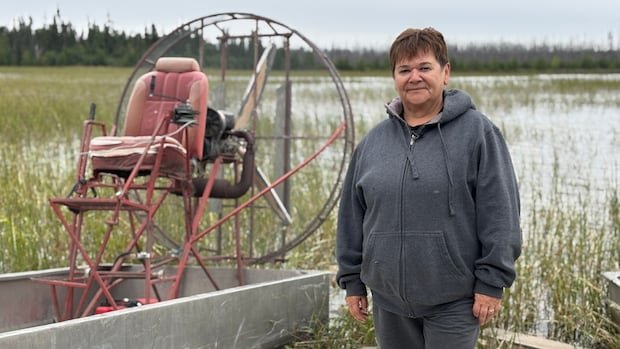Phyllis Smith ventures onto the crystal waters of Agumik Lake to examine her abundant wild rice patch, assessing the grain’s size and quality by tapping the plant against her boat. Some kernels yield firm rice, while others are hollow, devoured by rice worms, a troublesome pest causing distress for harvesters in northern Saskatchewan and impacting their livelihoods.
“Every year, the situation seems to deteriorate,” expressed Phyllis, a seasoned rice picker of over three decades. “The uncertainty of what to expect is disheartening.”
With rice worms migrating from the U.S. and Manitoba into Saskatchewan’s waterways, disrupting the traditional crop’s harvest, calls are increasing among harvesters to find a remedy. Many emphasize the urgency to address the issue before the future of wild rice, a staple food for Indigenous communities for centuries, faces jeopardy.
Phyllis and her husband, Tommy Smith, have been harvesting near Pinehouse, Sask., around 380 kilometers north of Saskatoon, for years, learning the plant’s cultivation and picking techniques from their families. While they initially noticed sporadic worm presence in the rice in recent years, the pests proliferated during the last harvest season. The couple managed to gather only 20 bags, a sharp decline from the usual average of about 400 bags before the insects invaded.
“You rely on rice for various purposes, so the impact is significant,” shared Tommy, estimating a loss of over $40,000 during the last harvest. “It’s a substantial setback with financial repercussions.”
Wild rice plays a crucial role in the economy of many Cree and Métis communities in northern Saskatchewan. A successful harvest can bring up to $100,000 for a family, often leading to employment opportunities through hiring assistance. However, the diminished crop is eroding income, leaving some workers with minimal tasks and prompting certain harvesters to contemplate selling their equipment.
Efforts are underway to find a solution, with a coalition of researchers from the University of Saskatchewan, Saskatchewan Polytechnic, and the National Research Council of Canada collaborating with harvesters to understand the northward movement of rice worms. Tim Sharbel, a plant sciences professor at the University of Saskatchewan, is part of this group engaging with northern communities to address the issue.
While the exact reasons for the worms’ migration are unclear, researchers speculate that forest fires and the transportation of bags between different lakes could be contributing factors. The team is developing a trap using pheromones to attract rice worm moths away from the rice before egg-laying, with successful initial testing near The Pas, Man., collecting a substantial number of insects. Further trials are planned for the upcoming spring.
“It’s a promising initiative, backed by the support of the affected harvesters,” stated Sharbel. “The livelihoods of many individuals are at stake due to this situation.”
Pankaj Bhowmik, a senior research officer at the National Research Council, is utilizing an “electronic nose” handheld device to study the rice composition and its impact on flavor. The goal is to introduce more technology to harvesters to gather valuable crop information.
“We aim to combine traditional knowledge with modern scientific data for a comprehensive approach,” emphasized Bhowmik.
Despite the challenges posed by the rice worms, Lionel Smith, a buyer and longtime harvester in Pinehouse, remains optimistic about finding effective solutions through collaboration with scientists. With a significant portion of his crop damaged by the insects this season, Lionel, who also works as a commercial fisherman, earns between $70,000 to $100,000 annually from wild rice.
“We will persevere. Giving up is not an option. That’s out of the question,” asserted Lionel, highlighting the additional concern of an aging workforce in the field, with most harvesters in their 60s and a scarcity of young entrants.
As Phyllis Smith prepares for this year’s harvest on Agumik Lake, an initial sampling indicates a reduced worm presence compared to the previous fall. Despite contemplating selling their equipment and leaving the industry, she and her husband, like other harvesters, are determined to confront the challenges and uncertainties ahead.
“The thought of abandoning my harvesting boat lingers, unsure if I’ll ever encounter thriving rice again,” expressed Phyllis. “I’m almost on the verge of giving up.”
